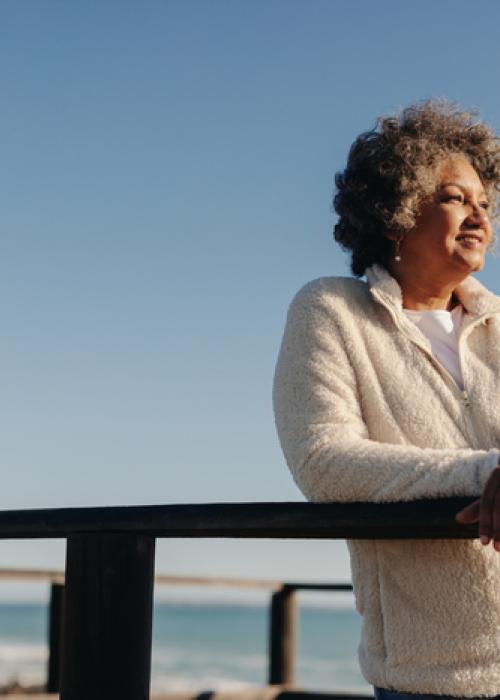“If you are experiencing breast pain, you may have concerns about what that pain means and when you should seek help,” said Lynette Mendoza, DO, Catholic Health Physician Partners Breast Surgeon. “Breast pain, also called mastalgia, is actually a common condition.”
Dr. Mendoza noted two types of breast pain—cyclic and non-cyclic—have different symptoms and causes.
What is cyclic breast pain?
Cyclic breast pain occurs due to hormonal fluctuations caused by a menstrual cycle. Those fluctuations cause breast swelling, tenderness and soreness. You may have pain in one or both breasts in the upper or outer areas a week or more before your period starts. The pain decreases and eventually disappears once your period begins. Cyclic breast pain commonly happens in premenopausal women.
What is non-cyclic breast pain?
Non-cyclic breast pain is not associated with hormonal fluctuations or the menstrual cycle. The breast pain is typically limited to a specific area of one breast and can cause acute, sharp or burning sensations. Pain intensity and duration of symptoms vary by person.
What are the common causes of breast pain?
Common causes of breast pain in premenopausal women include:
- Hormonal fluctuations
- Benign cyst(s)
- Benign fibroadenoma(s) (non-cancerous lumps)
- Excessive caffeine intake
- Obesity
- Wearing a non-supportive bra
Common causes of breast pain in postmenopausal women include:
- Excessive caffeine intake
- Obesity
- Wearing a wrong-sized bra
Other causes of breast pain include:
- Breast injury
- Breast infection
- Breastfeeding
- Breast implants
- Medications
- Inflammation (including costochondritis—where your bones and cartilage meet in your rib cage)
- Pulled muscle
- Larger breasts
- Surgical scars
When should I see a doctor for breast pain?
“Make an appointment with your doctor if the pain is frequent, intense and interfering with daily activities,” said Dr. Mendoza. “Your doctor will conduct a breast exam and evaluate factors such as age, menstrual cycle, lifestyle habits and family history. An imaging test, such as a mammogram or sonogram, may be recommended.”
Does breast pain indicate breast cancer?
Breast pain is not a typical sign of breast cancer. Inflammatory breast cancer can cause pain, but this type of cancer is rare. Make an appointment with your doctor if you are concerned about your pain and symptoms.
How is breast pain treated?
Your doctor may recommend over-the-counter medications like ibuprofen or acetaminophen for cyclic breast pain. For non-cyclic pain, your doctor will first need to identify the cause of the pain and then recommend a personalized treatment plan. For example, if you have a benign lump or cyst, your doctor will remove it with a minimally invasive procedure.
“You may also need to make lifestyle changes, like reducing or eliminating caffeine, eating a diet lean in fat and sodium, exercising regularly and not smoking,” said Dr. Mendoza.
Talk to your doctor before taking medication or starting a new nutrition and exercise plan.
Call 866-MY-LI-DOC (866-695-4362) to find a Catholic Health physician near you.







